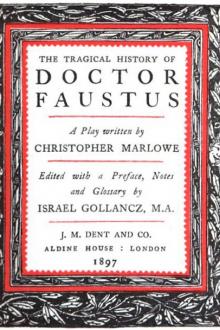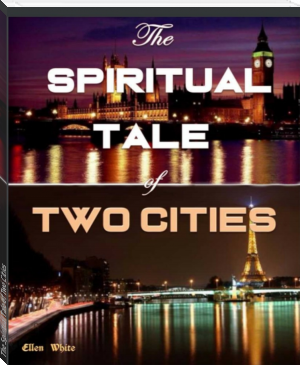Insurgency, Ellen Gould-Harmon [good novels to read in english .TXT] 📗

- Author: Ellen Gould-Harmon
Book online «Insurgency, Ellen Gould-Harmon [good novels to read in english .TXT] 📗». Author Ellen Gould-Harmon
Spring, summer, and autumn passed, and winter came, and Luther still remained a prisoner. Aleander and his partisans exulted as the light of the gospel seemed about to be extinguished. But instead of this, the Reformer was filling his lamp from the storehouse of truth; and its light was to shine forth with brighter radiance. In the friendly security of the Wartburg, Luther for a time rejoiced in his release from the heat and turmoil of battle. But he could not long find satisfaction in quiet and repose. Accustomed to a life of activity and stern conflict, he could ill endure to remain inactive. In those solitary days the condition of the church rose up before him, and he cried in despair. "Alas! there is no one in this latter day of His anger, to stand like a wall before the Lord, and save Israel!"-- Ibid., b. 9, ch. 2. Again, his thoughts returned to himself, and he feared being charged with cowardice in withdrawing from the contest. Then he reproached himself for his indolence and self-indulgence. Yet at the same time he was daily accomplishing more than it seemed possible for one man to do. His pen was never idle.
While his enemies flattered themselves that he was silenced, they were astonished and confused by tangible proof that he was still active. A host of tracts, issuing from his pen, circulated throughout Germany. He also performed a most important service for his countrymen by translating the New Testament into the German tongue. From his rocky Patmos he continued for nearly a whole year to proclaim the gospel and rebuke the sins and errors of the times. But it was not merely to preserve Luther from the wrath of his enemies, nor even to afford him a season of quiet for these important labours, that God had withdrawn His servant from the stage of public life. There were results more precious than these to be secured. In the solitude and obscurity of his mountain retreat, Luther was removed from earthly supports and shut out from human praise.
He was thus saved from the pride and self-confidence that are so often caused by success. By suffering and humiliation he was prepared again to walk safely upon the dizzy heights to which he had been so suddenly exalted. As men rejoice in the freedom which the truth brings them, they are inclined to extol those whom God has employed to break the chains of error and superstition. Satan seeks to divert men's thoughts and affections from God, and to fix them upon human agencies; he leads them to honour the mere instrument and to ignore the Hand that directs all the events of providence. Too often religious leaders who are thus praised and reverenced lose sight of their dependence upon God and are led to trust in themselves. As a result they seek to control the minds and consciences of the people, who are disposed to look to them for guidance instead of looking to the word of God. The work of reform is often retarded because of this spirit indulged by its supporters. From this danger, God would guard the cause of the Reformation. He desired that work to receive, not the impress of man, but that of God. The eyes of men had been turned to Luther as the expounder of the truth; he was removed that all eyes might be directed to the eternal Author of truth.
Chapter 9. Reform in Switzerland
In the choice of instrumentalities for the reforming of the church, the same divine plan is seen as in that for the planting of the church. The heavenly Teacher passed by the great men of the earth, the titled and wealthy, who were accustomed to receive praise and homage as leaders of the people. They were so proud and self-confident in their boasted superiority that they could not be moulded to sympathize with their fellow men and to become co-labourers with the humble Man of Nazareth. To the unlearned, toiling fishermen of Galilee was the call addressed: "Follow Me, and I will make you fishers of men." Matthew 4:19. These disciples were humble and teachable. The less they had been influenced by the false teaching of their time, the more successfully could Christ instruct and train them for His service. So in the days of the Great Reformation. The leading Reformers were men from humble life--men who were most free of any of their time from pride of rank and from the influence of bigotry and priestcraft. It is God's plan to employ humble instruments to accomplish great results. Then the glory will not be given to men, but to Him who works through them to will and to do of His own good pleasure.
A few weeks after the birth of Luther in a miner's cabin in Saxony, Ulric Zwingli was born in a herdsman's cottage among the Alps. Zwingli's surroundings in childhood, and his early training, were such as to prepare him for his future mission. Reared amid scenes of natural grandeur, beauty, and awful sublimity, his mind was early impressed with a sense of the greatness, the power, and the majesty of God. The history of the brave deeds achieved upon his native mountains kindled his youthful aspirations. And at the side of his pious grandmother he listened to the few precious Bible stories which she had gleaned from amid the legends and traditions of the church. With eager interest he heard of the grand deeds of patriarchs and prophets, of the shepherds who watched their flocks on the hills of Palestine where angels talked with them, of the Babe of Bethlehem and the Man of Calvary.
Like John Luther, Zwingli's father desired an education for his son, and the boy was early sent from his native valley. His mind rapidly developed, and it soon became a question where to find teachers competent to instruct him. At the age of thirteen he went to Bern, which then possessed the most distinguished school in Switzerland. Here, however, a danger arose which threatened to blight the promise of his life. Determined efforts were put forth by the friars to allure him into a monastery. The Dominican and Franciscan monks were in rivalry for popular favour. This they endeavoured to secure by the showy adornments of their churches, the pomp of their ceremonials, and the attractions of famous relics and miracle-working images.
The Dominicans of Bern saw that if they could win this talented young scholar, they would secure both gain and honour. His extreme youth, his natural ability as a speaker and writer, and his genius for music and poetry, would be more effective than all their pomp and display, in attracting the people to their services and increasing the revenues of their order. By deceit and flattery they endeavoured to induce Zwingli to enter their convent. Luther, while a student at school, had buried himself in a convent cell, and he would have been lost to the world had not God's providence released him. Zwingli was not permitted to encounter the same peril. Providentially his father received information of the designs of the friars. He had no intention of allowing his son to follow the idle and worthless life of the monks. He saw that his future usefulness was at stake, and directed him to return home without delay.
The command was obeyed; but the youth could not be long content in his native valley, and he soon resumed his studies, repairing, after a time, to Basel. It was here that Zwingli first heard the gospel of God's free grace. Wittembach, a teacher of the ancient languages, had, while studying Greek and Hebrew, been led to the Holy Scriptures, and thus rays of divine light were shed into the minds of the students under his instruction. He declared that there was a truth more ancient, and of infinitely greater worth, than the theories taught by schoolmen and philosophers. This ancient truth was that the death of Christ is the sinner's only ransom. To Zwingli these words were as the first ray of light that precedes the dawn.
Zwingli was soon called from Basel to enter upon his lifework. His first field of labour was in an Alpine parish, not far distant from his native valley. Having received ordination as a priest, he "devoted himself with his whole soul to the search after divine truth; for he was well aware," says a fellow Reformer, "how much he must know to whom the flock of Christ is entrusted."--Wylie, b. 8, ch. 5. The more he searched the Scriptures, the clearer appeared the contrast between their truths and the heresies of Rome. He submitted himself to the Bible as the word of God, the only sufficient, infallible rule. He saw that it must be its own interpreter. He dared not attempt to explain Scripture to sustain a preconceived theory or doctrine, but held it his duty to learn what is its direct and obvious teaching. He sought to avail himself of every help to obtain a full and correct understanding of its meaning, and he invoked the aid of the Holy Spirit, which would, he declared, reveal it to all who sought it in sincerity and with prayer.
"The Scriptures," said Zwingli, "come from God, not from man, and even that God who enlightens will give thee to understand that the speech comes from God. The word of God . . . cannot fail; it is bright, it teaches itself, it discloses itself, it illumines the soul with all salvation and grace, comforts it in God, humbles it, so that it loses and even forfeits itself, and embraces God." The truth of these words Zwingli himself had proved. Speaking of his experience at this time, he afterward wrote: "When . . . I began to give myself wholly up to the Holy Scriptures, philosophy and theology (scholastic) would always keep suggesting quarrels to me. At last I came to this, that I thought, `Thou must let all that lie, and learn the meaning of God purely out of His own simple word.' Then I began to ask God for His light, and the Scriptures began to be much easier to me."-- Ibid., b. 8, ch. 6.
The doctrine preached by Zwingli was not received from Luther. It was the doctrine of Christ. "If Luther preaches Christ," said the Swiss Reformer, "he does





Comments (0)